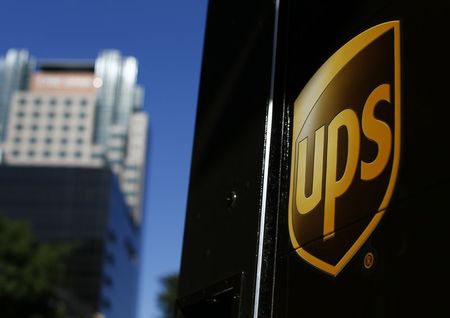By Nick Carey ATLANTA (Reuters) - United Parcel Service Inc's chief executive officer said on Monday the company's closer collaboration with major retailers should bring a smooth holiday season, but he said UPS would charge customers more or even refuse packages if last-minute sales by a major customer threaten the company's system.
"With the changes we've made, I feel very comfortable about peak (season) this year," David Abney told Reuters in an interview at UPS headquarters in Atlanta.
Imposing additional charges or refusing delivery for existing customers would be "the exception versus the rule," Abney said. The company has put in place a "control tower" system in which company experts manage the flow of packages and anticipate problems.
Last year a late surge in pre-Christmas online retail sales left an estimated 2 million express packages undelivered in the United States. UPS, the world's largest package delivery company, was badly affected by the last-minute flood of packages.
FedEx Corp, the main rival of UPS, is also working with retailers to manage package volume forecasts. The Memphis-based company has made it clear that if a late, unplanned holiday sale threatened to derail its system, it could decline that business.
Peak day package volumes at UPS and FedEx in the run-up to Christmas have jumped 40 percent and 57 percent, respectively, since 2009.
Those volumes are roughly double the average daily number of packages the companies haul. Deloitte LLP predicts U.S. e-commerce sales growth of up to 14 percent this holiday season, and robust online growth is expected to continue.
Abney said the company's brick-and-mortar and e-commerce retail customers are holding "Black Friday" sales earlier than normal this year and that UPS believes it is part of an effort by retailers to find ways to smooth out the pre-Christmas online ordering bulge.
If a late e-commerce surge raises costs for UPS this year, Abney said, "We certainly in 2015 and beyond will look very closely at what we need to do" to offset those costs, including the possibility of holiday season price increases.
The actual delivery of a package is the most cost- and labor-intensive part of what companies like UPS and FedEx do. Delivering to residential addresses is more expensive than to businesses, since businesses tend to receive multiple packages.
Managing those costs as e-commerce continues to grow is a priority, Abney said. E-commerce accounts for about 45 percent of UPS' business, and should reach 50 percent within five years.

"I think anybody that's delivering directly to consumers is certainly going to be looking at those costs," he said.
(Editing by Meredith Mazzilli and Douglas Royalty)
